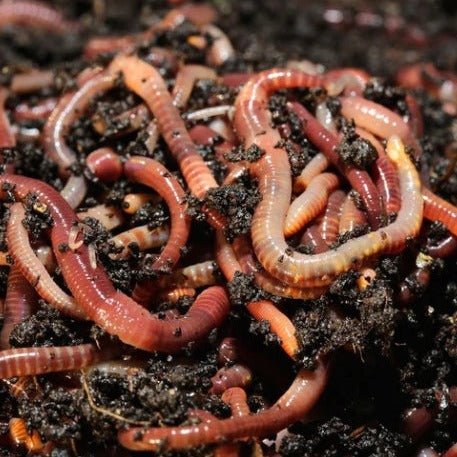Keep Your Lawn Green and Healthy with Expert Advice from Lake Hickory Bait
Keep Your Lawn Green and Healthy with Expert Advice from Lake Hickory Bait
Blog Article
The Extraordinary World of Red Wigglers: Boost Your Dirt Fertility Today
These small yet effective organisms change natural waste right into important worm spreadings, significantly improving dirt health and promoting lasting practices. As we check out the advantages of vermicomposting and the useful actions to develop an effective worm bin, the possible influence of these worms on your gardening success ends up being significantly evident.
Comprehending Red Wigglers
Red wigglers, medically known as Eisenia fetida, are a types of earthworm that play a crucial role in improving dirt fertility. These worms grow in organic-rich settings, such as compost heaps and decomposing plant material, where they consume organic waste and excrete nutrient-dense spreadings. Their distinct composition, including a fractional body and a clitellum, permits them to duplicate rapidly and efficiently process big quantities of raw material.

The ecological significance of red wigglers expands past mere waste processing; they add to the soil food internet, cultivating a varied area of microbes that additionally enhance dirt health and wellness. Understanding the biology and habits of red wigglers is vital for harnessing their complete potential in lasting agriculture and horticulture methods.
Advantages of Vermicomposting
(Red Wiggler Express)Taking advantage of the power of red wigglers via vermicomposting deals numerous benefits that dramatically improve dirt health and fertility. Among the primary advantages is the manufacturing of nutrient-rich worm castings, which are an outstanding all-natural fertilizer. Red Wiggler Express. These castings consist of important nutrients like nitrogen, phosphorus, and potassium, advertising robust plant development and boosting crop returns
The existence of worm spreadings enhances dirt appearance, allowing for better water retention and drainage. Red wigglers help break down organic matter, accelerating decay and recycling nutrients back into the soil.
Vermicomposting also fosters microbial activity, which is essential for a healthy dirt ecosystem. Beneficial microorganisms thrive in the visibility of worm spreadings, aiding in the break down of organic materials and enhancing nutrient schedule to plants.
Last but not least, vermicomposting functions as a reliable waste monitoring remedy, minimizing garbage dump waste by recycling kitchen scraps and various other natural materials. This not only adds to ecological sustainability however also promotes a visit the website round economic situation within horticulture and agriculture.
How to Establish a Worm Bin
Establishing a worm bin is an uncomplicated procedure that can considerably boost your composting initiatives. Begin by choosing a suitable container, which can range from a readily offered worm container to a basic plastic or wooden box (Red Wiggler Express). Ensure the container has sufficient ventilation; small openings in the lid and sides will certainly help with air blood circulation
Following, create a bed linens layer to offer a comfy atmosphere for the red wigglers. This can be made from shredded newspaper, cardboard, or coconut coir, dampened to a damp, sponge-like uniformity. Fill the container to about one-third complete with this bedding material.
When the bedding is prepared, it's time to present the worms. Red wigglers flourish in natural waste, so place them carefully onto the bedding. Cover the worms with a light layer of added bedding to aid them accustom.
Feeding Your Red Wigglers
Giving the best food for your red wigglers is essential for their health and wellness and the efficiency of your composting system. Red wigglers prosper on a varied diet plan, largely consisting of natural materials such as fruit and veggie scraps, coffee premises, and shredded paper. These materials not only give important nutrients yet likewise contribute to the microbial activity in the worm bin, which is crucial for the worms' digestion.
It is very important to stay clear of particular foods, such as dairy products, oils, and meats, as these can attract insects and develop undesirable smells. Furthermore, citrus peels and excessively zesty foods must be limited because of their possible to hurt the worms. A well balanced method to feeding entails checking the amount of food introduced to the bin, guaranteeing that it is taken in within a practical timespan to avoid excess waste buildup.
To advertise optimal food digestion, it is advantageous to slice or shred bigger food products before adding them to the container. This practice enhances the area for microbial action, promoting quicker disintegration and improving the overall effectiveness of your composting system. Routinely observing the worms' feeding routines will assist you adjust their diet plan as needed.
Using Worm Spreadings in Your Yard

(Lake Rhodhiss Bait)Incorporating worm spreadings into your yard can be achieved by blending them into the dirt or utilizing them as a top dressing. The slow-release nature of these spreadings makes certain that nutrients are readily available to plants over a prolonged duration, minimizing the requirement for synthetic plant foods. Furthermore, worm castings consist of helpful bacteria that advertise healthy and balanced dirt environments, enhancing the general strength of your garden.
To optimize the benefits, objective to apply around one component worm castings to 3 components soil in your planting beds. Regular applications can result in enhanced crop yields and healthier plants, making worm castings a vital source for both beginner and seasoned garden enthusiasts alike. By using this all-natural amendment, you can cultivate a growing yard while adding to lasting horticulture practices.
Final Thought
In final thought, red wigglers exemplify the important role of vermicomposting in boosting soil fertility. Their ability to transform natural waste into nutrient-rich castings considerably enriches soil framework and supports microbial diversity.
Report this page